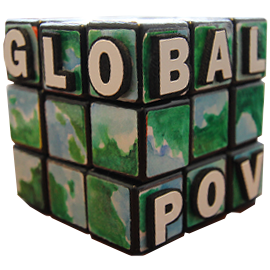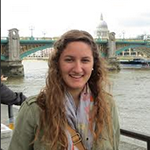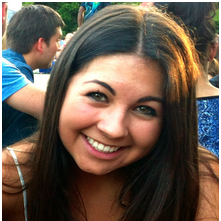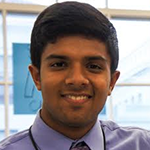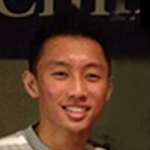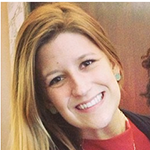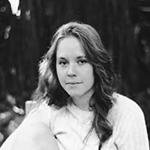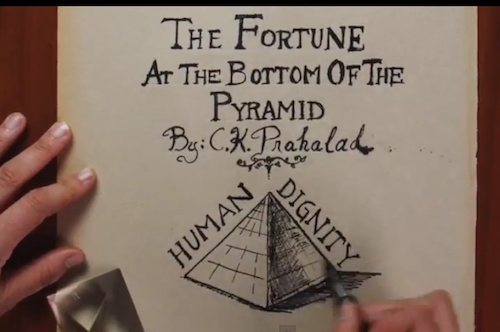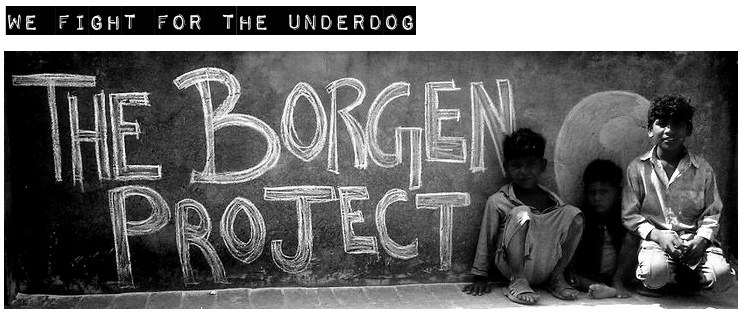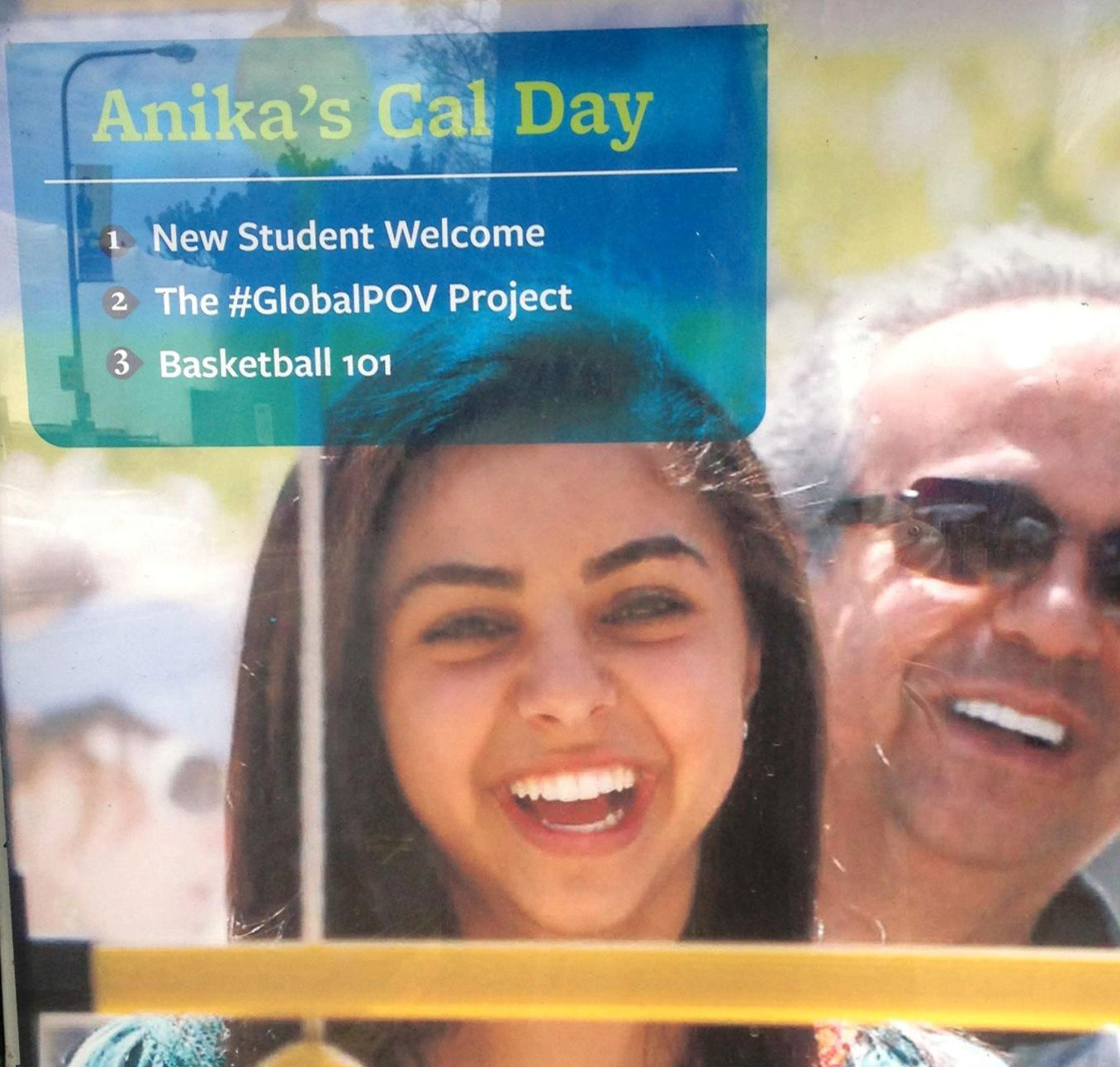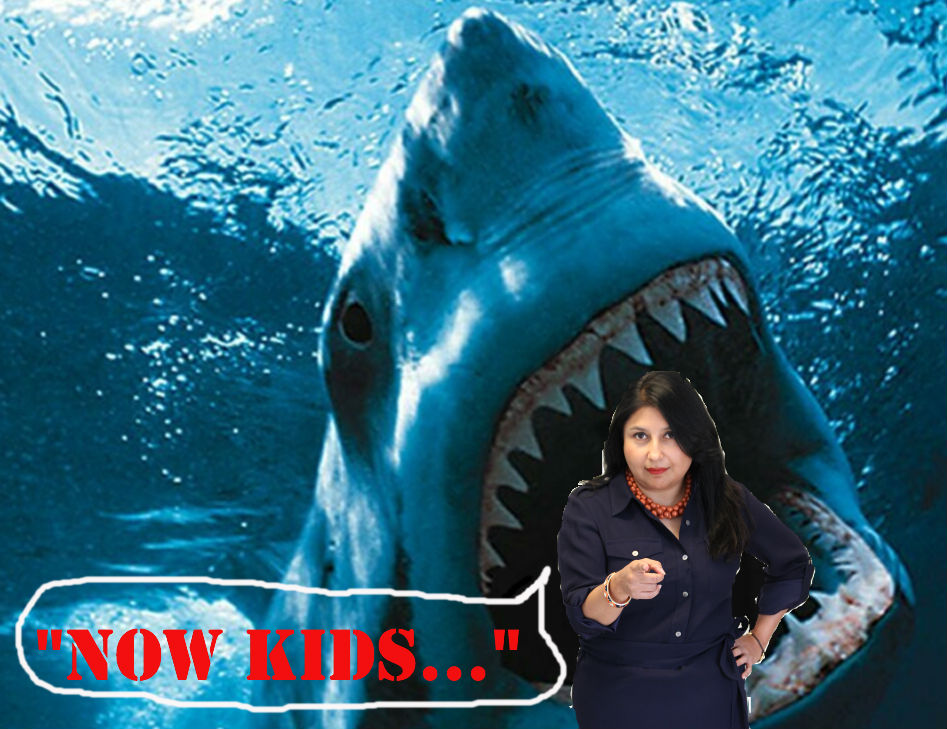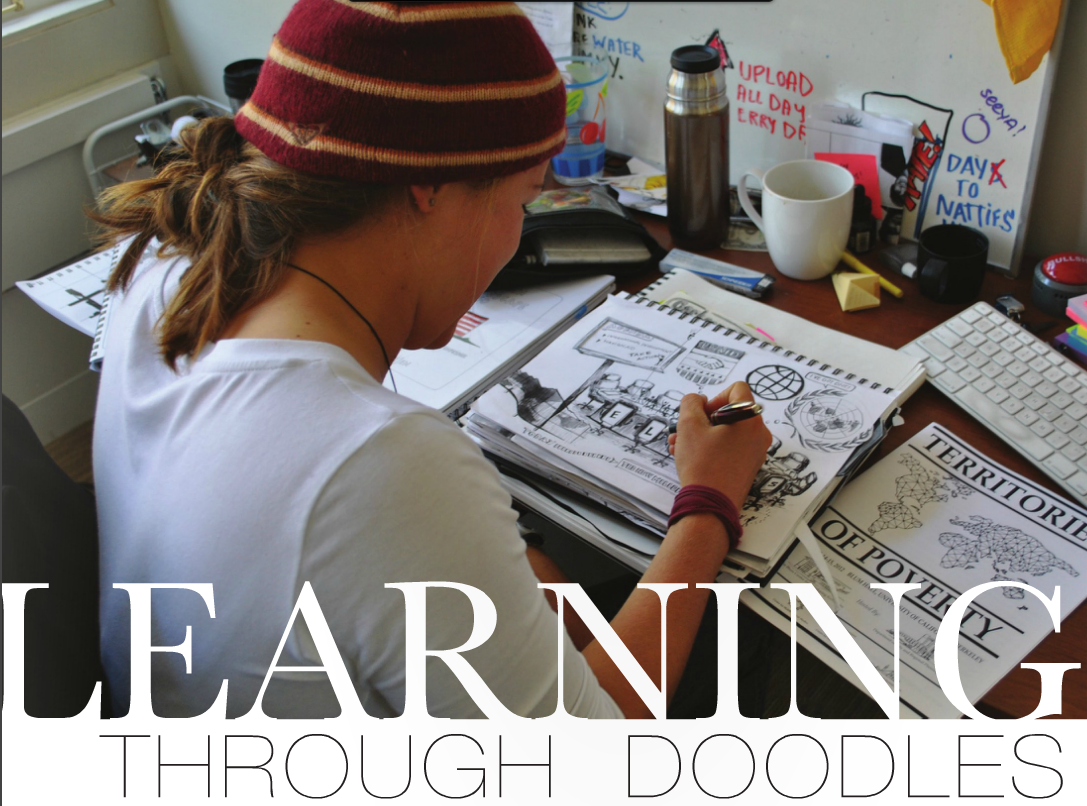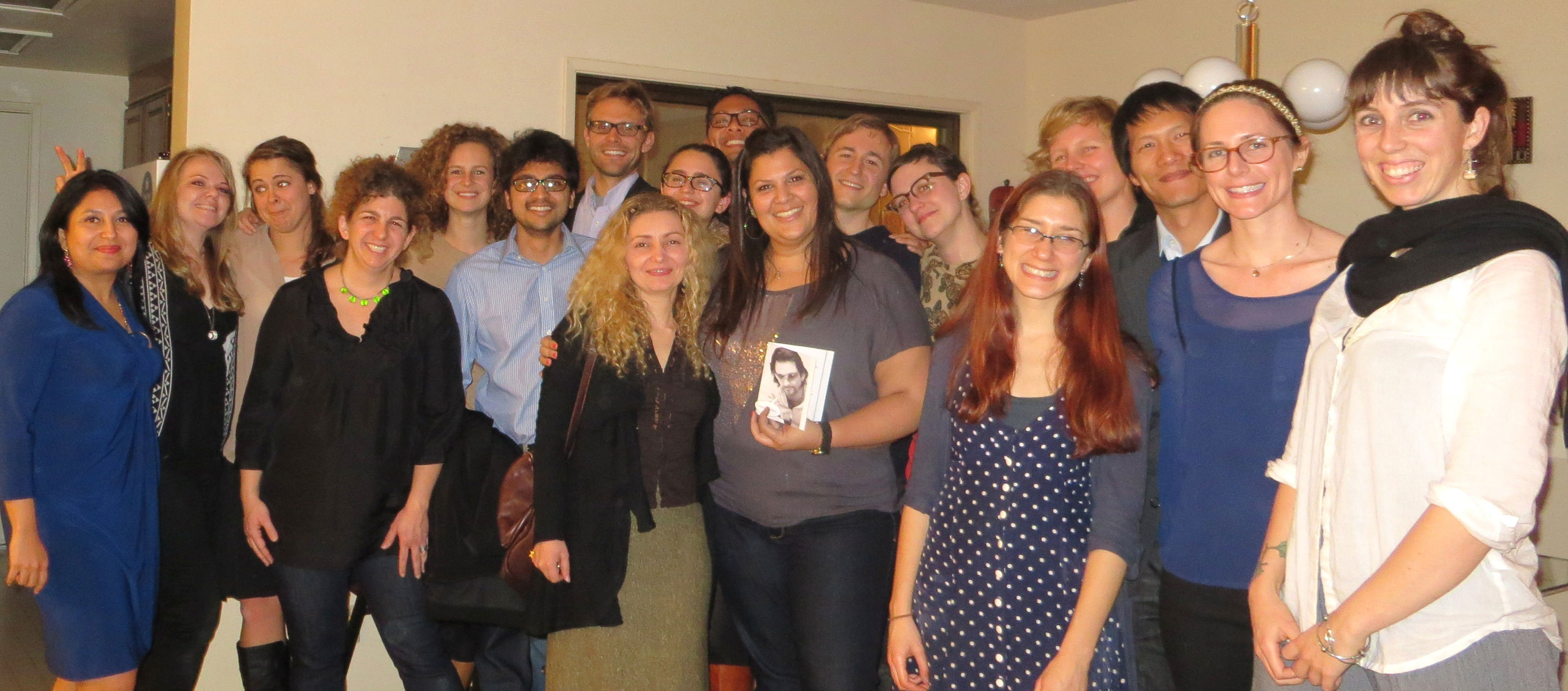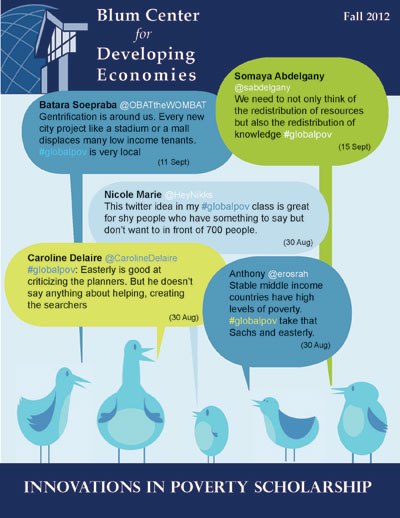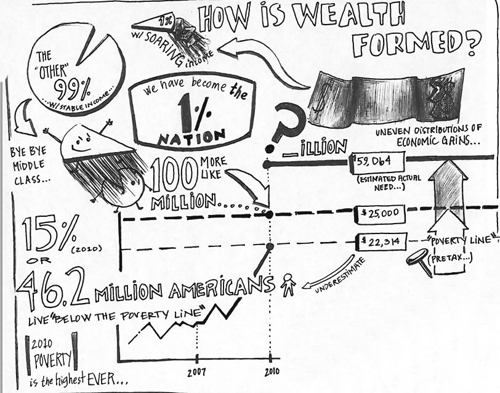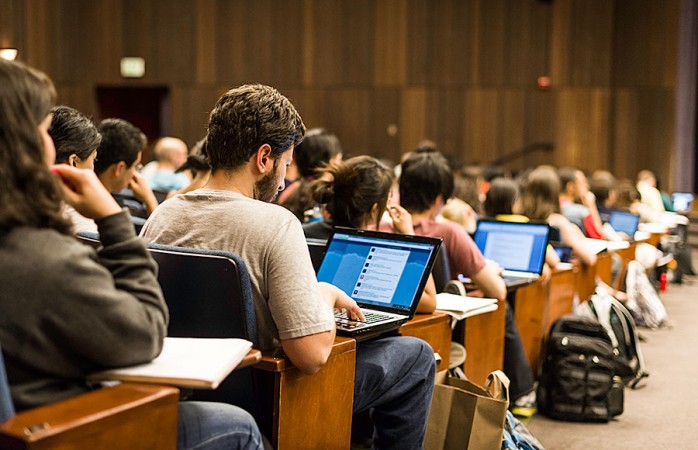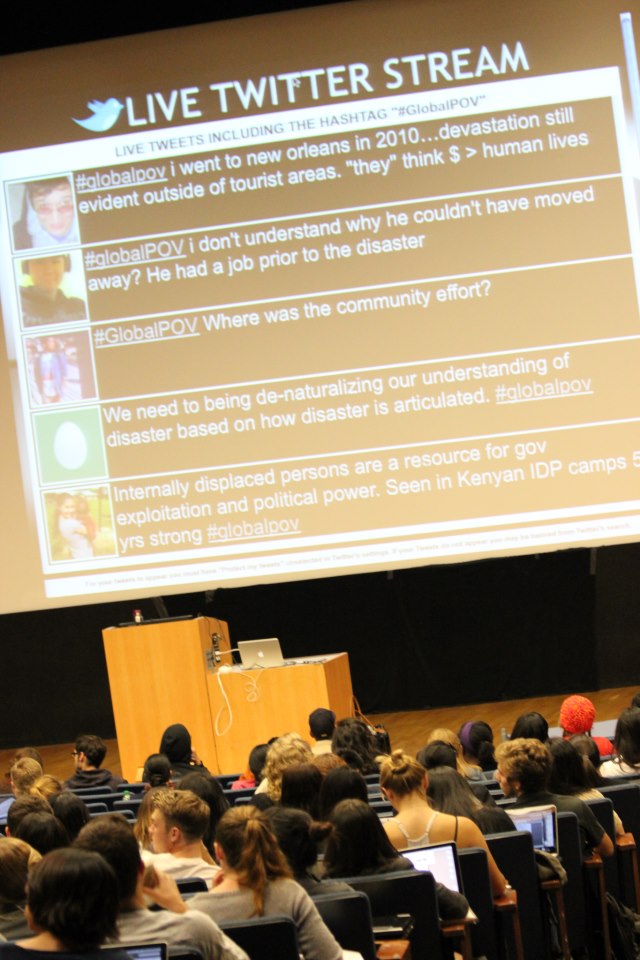For the last year, Abby, Professor Roy and the Blum Center staff have been running the #GlobalPOV show. In order to expand to the project, Abby and Professor Roy recruited seven undergraduate students to join the team earlier this fall through UC Berkeley’s Undergraduate Research Apprentice Program (URAP), which allows students to gain research experience and gather a few units while they’re at it. The students have been helping with outreach, tweeting, blogging (i.e., writing this blurb), storyboarding, and providing general assistance with video production. Adding youth, vigor, sass, and extra hands to shake their smart phones in the “Who Sees Poverty?” video, the URAP students have been hard at work throughout the semester and are excited to help the project continue growing. Read on to learn more about what each of them have been up to!
Ailen Vega
Ailen is a Political Economy and Geography major, with an overall focus on rural development policy as well as a regional focus on Latin America. She is part of #GlobalPOV’s video production team, helping with everything from creating visual representations of the script to working with sound effects. Ailen is interested in the way global development and poverty issues are presented to the public and is excited to join the #GlobalPOV team to encourage alternatives way of thinking about and reflecting upon conventional understandings of poverty. For the past three semesters, Ailen has been a member and an Administrative Vice President for Delta Phi Epsilon, Cal’s Foreign Service/International Affairs Co-Ed Fraternity. Apart from academics, Ailen enjoys traveling, kayaking with her family, and eating empanadas.
My favorite “aha” moment was from a brainstorming session, when we figured out that there’s “a need for patience in a world of seeming urgency.” Poverty action cannot be reactionary, but must evaluate the relationship between varying social, cultural, historical, economic, and environmental influences upon a region.
Alex Berryhill
Alex is a Political Economy major and Public Policy minor. She is working with the outreach team, tweeting and blogging on current events, poverty issues and updates on all the awesome things the Global Poverty and Practice (GPP) Minor community is up to. Alex has a strong interest in the social movements, women’s rights and refugee law. For the last two years she’s worked at UC Berkeley’s student newspaper, The Daily Californian, where she’s helped publish several GPP students’ op-eds. Alex also is president of a non-profit on campus called FeelGood that sells grilled cheese sandwiches to help end world hunger. She’s studying in Nicaragua in the Spring to research youth advocacy, and is excited to apply the themes presented in the #GlobalPOV videos to her studies in Central America. Alex says her “hero” in the fight to end poverty is Eleanor Roosevelt, due to her independence, strength and influence in advocating for poverty programs and international human rights. Alex is currently looking for an I-heart-E-Roose tee-shirt.
My favorite ‘GPP line’ is: “ideas, too, can be weapons.” That’s what the #GlobalPOV Project does — it gives Millennials around the world access to the world’s most powerful weapons against inequality: knowledge, a lens for critical analysis, and a foundation for new ideas.
Shrey Goel
Shrey is an Environmental Science major, minoring in Global Poverty and Practice and on the Pre-Med track. Aside from helping out with the #GlobalPOV project on the Outreach Team, he is the Under-Secretary-General of External Relations for Berkeley Model United Nations (BMUN), a non-profit educational organization which runs an annual high school MUN conference on the Berkeley campus. For the past two years, Shrey has served as a hall staff member in the Berkeley residence halls, serving as a Residential Assistant last year at Clark Kerr and a Program Assistant this year at Unit 2. Shrey’s intellectual passion is learning about the complexities of how human health, environmental health, and poverty overlap and intersect. This upcoming summer, Shrey will be completing his GPP Minor Practice Experience in India for an organization called the Urban Health Resource Center. In his free time, he enjoys watching movies and listening to Arcade Fire all day.
Doling out prescriptions to global poverty is easy — engaging in a critical conversation about the complexities and deep-seated contradictions inherent in poverty action, on the other hand, is more meaningful to me. That’s what I like about the #GlobalPOV Project: it doesn’t just claim to have the answers, but instead gives people the questions that need to be asked.
Nathan Nguyen-Le
Nathan is a Political Economy major and Creative Writing minor, and is working with Abby to create a short video describing her weekly schedule and all the processes involved in making the #GlobalPOV videos. He says that many would be surprised how many hours and days and weeks Abby must work to put out a quality product. Living in the information age, Nathan said it has become increasingly difficult to capture people’s attention, especially when education is thrown in the mix. Here is where he says the #GlobalPOV Project becomes very interesting: it blends the two, education and entertainment, into one seamless entity and keeps the audience’s attention through its creativity and visual effects.
Although many volunteer in developing countries helping to feed the hungry, house the homeless, and give jobs to the jobless, #GlobalPOV brings light the economic and social cleavage between the poor and the rich, here in the USA.
Rebecca Peters
Rebecca is a senior in the Global Poverty and Practice minor, studying Society & Environment and Interdisciplinary Studies. She is working with the Outreach Team and focusing on creating a unified platform for Twitter, Facebook, Instagram, and other multimedia for #GlobalPOV. She is working with Alex to create a blog that will connect students, faculty, and the global community to the #GlobalPOV Project. She hopes to further critical engagement with the ideas behind #GlobalPOV and create interactive ways for students to share their thoughts and learn from each other. She will continue critical engagement with these issues next year as a Marshall Scholar studying Poverty and Development at Manchester and Environmental Policy at Oxford.
#GlobalPOV defies definition because it pushes the artificial boundaries of inclusion and exclusion, voice and dispossession, oppression and resistance with actors whose lines of identity — student and professor, microfinance donor and recipient, 99% and 1% — are mutable and always in motion.
Julia Higgins
Julia is a Political Economy major and Public Policy minor with an interest in international human rights, global development, and education reform and policy. She is working with the Outreach Team to help package the videos in a way that accurately conveys the project’s message and outlines the suggested use for the different types of people and groups who can use the work that the team has done to help raise awareness about global poverty. She is also going to be in contact with several GPP-oriented organizations that can help the #GlobalPOV Project “get the attention it deserves!” Julia has had an interest in poverty alleviation ever since she saw Professor Roy’s Ted Talk about un-knowing poverty and changing the public’s perspective on the poor. She is excited to help with the #GlobalPOV Project since it is a way to catalyze real, relevant change on a global scale.
One of my favorite things about #GlobalPOV is that it challenges much quoted proverbs and age-old adages that have become clichés in the world of development…the videos do a great job of providing education about global poverty and alleviation strategies by pinpointing the real issues that need attention and calling Millennials to action to catalyze change in every way they can.
Kelly Leilani Main
Leilani is an Interdisciplinary Studies major with a focus on Art, Politics and Society. She intends to study Architecture and Urban Planning for her Master’s Degree with a concentration in post-conflict reconstruction and community planning in the Middle East. She also facilitates the “Art For Social Change” DeCal and is continuously inspired by the drive and creativity of the Berkeley campus. She thinks that the #GlobalPOV Project is the essence of the future of education because of its interdisciplinary approach and analysis, and because she is passionate about the potential of the arts as a powerful educational tool. She is part of the creative team because of her critical eye and enthusiasm for the creative process. She also is program coordinator and education director for The Olive Tree Initative at UC Berkeley, a conflict-resolution and educational initiative, as well as an intern at the Berkeley Art Center, where she seeks to empower community action through cultural production and exchange.
Poverty action isn’t about taking your camera to an underprivileged neighborhood on the other side of the world. Poverty action is recognizing the faults and flaws of one’s own neighborhood and one’s own self. It is working to make concrete, long-lasting changes by challenging everything.
